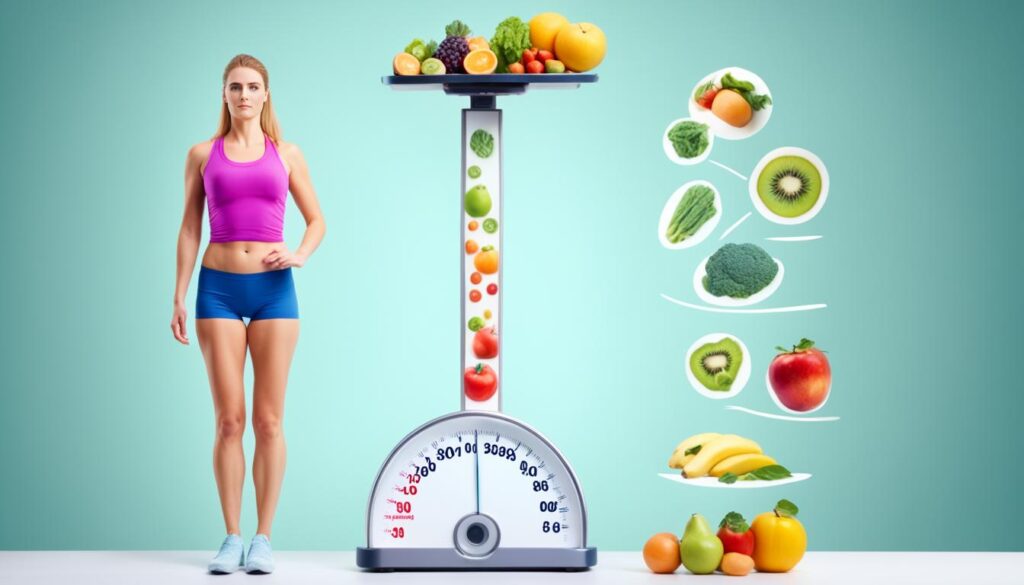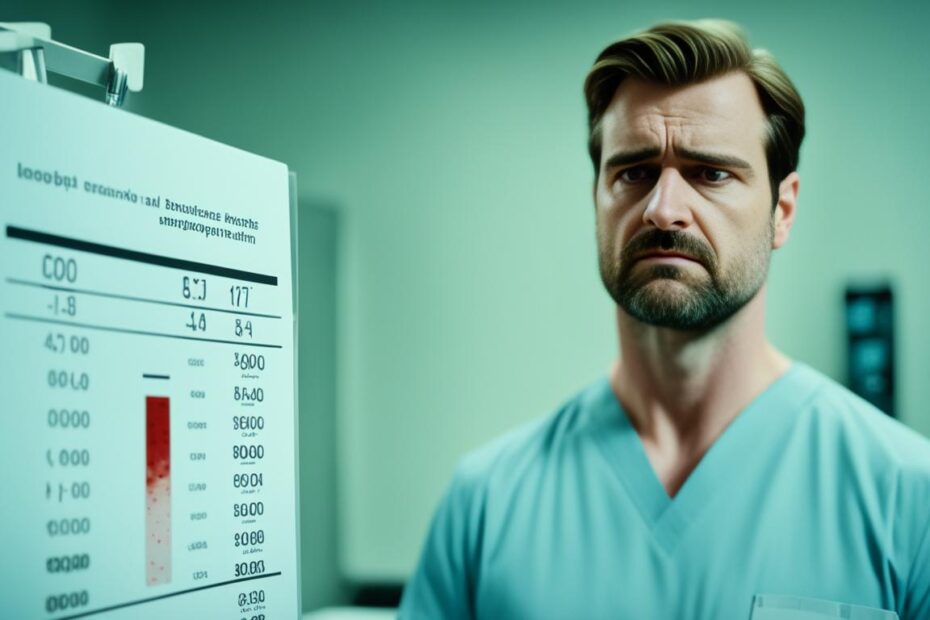People are worrying more about anemia from losing weight. I’ve seen many focus on their diets and want fast changes. But, losing weight too quickly can have some scary effects.
Many wonder if losing weight can make you low in iron. Iron is super important for our body’s health. In this article, we’ll look into how weight loss and anemia could be connected. This will help you understand the risks better.
Next, we’ll check out real facts and clear out any wrong ideas. We’ll also talk about keeping healthy while reaching your weight goals. Let’s find out the real scoop on how losing weight affects our blood health.
The Relationship Between Weight Loss and Anemia
Weight loss and anemia have a tight link. I’ll explain how anemia, its effects, and weight changes connect. You’ll understand why watching your weight is good for your blood.
What is Anemia?
Anemia happens when your body lacks enough healthy red blood cells. This makes it hard to carry oxygen. Signs of anemia with weight loss include feeling tired, weak, and having pale skin. These can look like effects of a diet, making it hard to spot anemia.
Weight Loss and Blood Health
Losing weight fast can cause a lack of essential nutrients. One main problem is not getting enough iron, vitamin B12, or folate. These are key in making red blood cells. If you lack them, you might develop anemia.
Busting Anemia Myths
Some think anemia always means losing weight. But, it’s more complex. Anemia might decrease hunger, but some treatments can make you gain weight. It’s not the same for every person.
- Anemia doesn’t always mean weight loss
- Weight loss doesn’t automatically cause anemia
- Balanced diets can prevent both issues
Knowing these truths helps us lose weight safely. Eating foods rich in nutrients keeps us away from anemia. It also helps us meet our health goals.
Nutritional Deficiencies During Weight Loss
Weight loss can be hard. Losing weight without losing nutrients is crucial. Let’s talk about how dieting impacts our bodies. And why getting the right nutrition is important.
Iron Deficiency and Anemia
Not having enough iron is a big worry during diets. Cutting calories often means less red meat. This can cause anemia. It’s shown that half of those who do weight loss surgery face iron issues. So, it’s not just about looking thinner, but also staying healthy.

Essential Nutrients at Risk
After losing weight quickly, you can be short on things other than iron. Vitamin B12 and folate are examples. They help with energy and cell work. Not having enough can leave you feeling tired and frail.
Balanced Nutrition is Key
I focus on eating a mix of foods to stay healthy while losing weight:
- Lean meats and beans for iron
- Leafy greens for folate
- Dairy or fortified foods for B12
A diverse diet helps lower the chance of running low on nutrients. Losing weight healthily isn’t just about eating less. It’s also about feeding your body what it needs.
Does Weight Loss Cause Anemia?
People often ask, “Does weight loss cause anemia?” The answer is not simple. Weight loss by itself doesn’t lead to anemia. But, losing weight too fast can cause a lack of important nutrients. This lack of nutrients can then lead to anemia.
Rapid weight loss means our bodies might not get enough iron, vitamin B12, and folate. These are important for making our blood cells healthy. Without them, anemia might happen.
What is the link between losing weight and anemia? Here’s a few key points:
- Going on extreme diets can lower the amount of iron we get, which increases anemia risk.
- Some pills for weight loss can stop our bodies from absorbing these needed nutrients.
- Losing weight fast can make you feel tired and weak, just like how you feel with anemia.
Anemia can sometimes itself lead to weight loss. When someone has anemia, they might not feel like eating. Or, their body might not burn calories as fast. This can lead to losing weight without trying.
To keep away from these problems, try to lose weight in a balanced way. This means eating foods rich in nutrients and losing weight slowly. This approach can prevent anemia and keep you healthy while you reach your weight loss goals.
Potential Causes of Anemia in Weight Loss Journeys
When we lose weight, we might run into some health problems. Anemia is one issue that could come up. It happens when you don’t have enough red blood cells. There are a few reasons why weight loss could lead to anemia.
Weight Loss Medications and Iron Absorption
Some over-the-counter weight loss drugs can mess with how your body takes in iron. If less iron is absorbed, it might cause anemia. It’s smart to watch out for this if you’re using weight loss products.
Nutrient Deficiencies from Extreme Dieting
Going on extreme diets can be bad for your health. If you cut a lot of calories, your body may not get needed nutrients. Iron, vitamin B12, and folate help make red blood cells. If you lack these, it could cause anemia.

Hidden Health Conditions
Some health problems can make you lose weight and get anemia. Conditions like celiac disease, certain cancers, or problems with the bowels are examples. If you’re losing weight and feeling anemic, see a doctor. They can help figure out what’s going on.
Anemia After Bariatric Surgery
Bariatric surgery helps with weight loss, but it has some downsides. Anemia is one issue that can happen after this surgery. Your body doesn’t absorb nutrients as well anymore. Check-ups and taking the right supplements are important for preventing anemia.
Knowing these causes can help you stay healthy while losing weight. It’s safest to start your weight loss journey under a doctor’s care. This can help avoid these health risks.
Recognizing Anemia Symptoms During Weight Loss
When I lose weight, I watch out for anemia signs. These signs may look like the effects of dieting. Feeling tired or weak while losing weight is normal, but it could be something more.
I watch for these signs closely:
- Shortness of breath
- Pale skin
- Heart palpitations
- Headaches
- Dizziness
Not all weight loss signs are from dieting. If my hair and nails get weak or my tongue gets sore, I should stop. Wanting to chew ice or other weird things can be a sign too.
Listening to my body is so important now. I won’t ignore these symptoms. Rather, I’ll talk to my doctor for a check-up. A blood test can show if anemia is affecting me, helping me stay healthy as I lose weight.
Prevention Strategies: Maintaining Blood Health While Losing Weight
Losing weight and staying healthy can be hard. I’ve found some important ways to prevent iron and other nutrient shortages when you are dieting.
Incorporating iron-rich foods into your diet
I eat lots of iron-rich foods to stop anemia during weight loss. Good choices include:
- Lean meats like chicken and turkey
- Fish such as salmon and tuna
- Beans and lentils
- Dark leafy greens like spinach and kale
The role of supplements in preventing anemia
Just diet sometimes isn’t enough. I talk with my doctor about taking iron or multivitamin pills to avoid anemia. This help from supplements can prevent bigger issues later.
Regular health check-ups and blood tests
I always see my doctor for check-ups. They do blood tests to watch my iron and health. Doing these checks often helps me stay healthy.
With these steps, I keep my blood health good while losing weight. It’s all about balancing dieting and taking care of my body right.
Treatment Options for Weight Loss-Related Anemia
The way we treat anemia during weight loss changes by cause. Often, iron pills are the first step for those not getting enough through food. These pills help make more red blood cells. This cuts down on being tired or dizzy.
Some might need shots of vitamin B12, especially if they had bariatric surgery. Their bodies find it hard to take in nutrients correctly. For these folks, getting the right nutritional support is really important.
- Iron supplements
- Vitamin B12 injections
- Folate supplements
- Dietary changes to include more iron-rich foods
- Blood transfusions in severe cases
It’s key to deal with why you have anemia as you work on losing weight. This might mean changing your diet or how you lose weight. A mix of ways is important for keeping your health while achieving weight goals.
Feeling the effects of anemia while losing weight means it’s time to see a doctor. They can set up a plan just for you, based on what you need and your health.
Long-Term Health Considerations: Balancing Weight Loss and Blood Health
Keeping a balance between losing weight and staying healthy is key. Extreme diets can cause serious long-term problems. These may include anemia and not getting enough nutrients. Iron deficiency anemia is the most widespread form of anemia, affecting 8% to 9% of people around the globe.
I focus on losing weight in a healthy way to prevent malnutrition related anemia. It’s extra important for women because of pregnancy and heavy periods. In the US, 10% of women of childbearing age have iron-deficiency anemia. This is much more common than in young men.
Getting regular health checks, including blood tests, is important. This helps to catch and avoid anemia and other problems. It’s useful to work with a dietitian on a plan that is just for you. A good plan helps with weight and blood health. It makes sure you eat enough foods that are rich in iron, like meat, seafood, beans, and greens.
